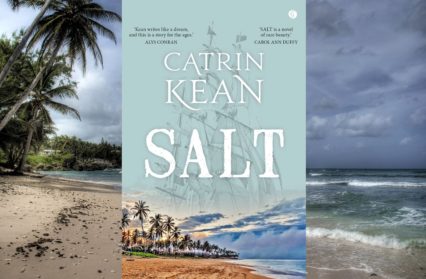Gemma Pearson reviews the debut novel from Catrin Kean, Salt, which explores salt as a metaphor for separation and suffering.
“A life is so long and yet so short, […] so much happens, and so little.”
When you think of salt, what comes to mind? Maybe you imagine the salt shaker that sits at the kitchen table like a diminutive dinner guest, or the salt lamp that brightens your bedroom with a soft, pink glow. Perhaps you think of the salt bins at the side of roads that open like big yellow treasure chests whenever it snows. For others, historic salt mines, halite crystals, or seawater might spring to mind first. Salt is everywhere, and in Catrin Kean’s stirring debut novel, it is transformed into a metaphor for separation and suffering. In the words of Kean’s protagonist, “pain runs through families like seams of salt through rock.” Exploring the shifting dynamics of a relationship marred by working-class hardships and lingering post-abolition racism, Salt is a short but gorgeously crafted novel about the ‘what ifs’ and ‘if onlys’ that pepper a lifetime.
Catrin Kean is no stranger to the Welsh literary scene; she was awarded a place on the Hay Festival Writers at Work scheme from 2016 to 2018, and her short story collection, FOGTIME, won a Literature Wales Bursary this year. Salt, which has already received impressive commendations from the likes of Alys Conran (winner of the 2019 Wales Book of the Year) and former poet laureate Carol Ann Duffy, tells the story of Ellen, a domestic in late 19th century Cardiff, and Samuel, a Barbadian who travels the world’s waterways as a ship’s cook. Based on the true story of Kean’s own great-grandparents, Ellen and Samuel run away together, leaving Britain for the bright, boundless possibilities of San Francisco’s shores. When circumstances drive Ellen home, however, the adventurous, nomadic life that could have been, vanishes over the horizon. Forced to adapt to separation, destitution, and loneliness, the sweetness of their shared freedom soon turns sour.
Mirroring the drifting, seafaring paths of her characters, Kean’s novel winds between two timelines, separated by almost sixty years. The novel opens during the Cardiff Blitz – a series of Second World War air raids that resulted in the deaths of 355 people – when Ellen is old and ailing, waiting “to be turned to dust.” The second timeline is set in the late 1800s, painting a picture of Ellen and Samuel’s captivating love story. Grounded in historical truths, Salt is both a touching reclamation of Kean’s own familial history, and a culturally important narrative that seeks to shed light on a side of British history often overlooked. The devastating scenes of mistreatment against Ellen and Samuel’s mixed-race child, for example, highlights the vicious ignorance that underpins much of the systematic racism that still discriminates against black and minority ethnic Britons today.
Kean writes about such painful subject matter with grace and tenderness, rendering Salt, in the words of Carol Ann Duffy, “a novel of rare beauty.” Indeed, this novel is at its best during Kean’s scintillating prose passages that roll and flow like gentle, lulling waves. When Ellen and Samuel board the Mary Alice for example, Kean conveys the sights and sounds of a ship humming with life with remarkable clarity:
They sat with the song of the wind and the water all around them, and the sound of the ship, the engine’s heartbeat and the clapping of the sails, the quick feet of children, a burst of raised voices. […] From the galley they could hear the crackle of the ovens and further along the passage, from the steerage berths, came the sounds of voices: laughter, a quarrel, a baby crying.
Similarly, Kean’s description of a Barbadian street carnival, a section of the novel that bursts with the heady magnetism of young love, glitters with heat and colour:
She remembers the air smelling of burnt sugar and roasting meat and distant music coming closer; drums and fiddles and banjos and whistles. A dancing procession silhouetted against a turquoise sky.
This combination of evocative, dreamy accounts of life at sea and Kean’s talent for deliciously clean compound adjectives – “ice-bright” and “blackberry-haired” – leaves Salt dancing with vivid, transportive prose that borders on the poetic.
Telling the story of two lives set against the intergenerational, inherited trauma caused by slavery and colonialism, Salt is a gripping love story of significant cultural importance. In giving the complex history of her great-grandparents the space to be known, read, and remembered, Kean recovers a side of her family history that might otherwise have been lost. Kean’s choice of epigraph – “Someone, in another time, will remember us” (Sappho) – speaks to this vital process of reclamation. Recurring images of clocks, and Ellen’s frequent meditations on the fragility of life – “How is the world so frail?” – also stand as poignant reminders of time’s relentless, onwards pursuit. No one is insusceptible to being forgotten, and life, even if we don’t realise it, is always “ticking away,” flowing on an inexorable stream. Salt reminds us that all we can do is try to keep our heads above the water; to remember those we have lost, to reclaim forgotten stories, to live wildly, and to love freely.
Salt by Catrin Kean is out now from Gomer.
Gemma Pearson is a regular contributor to Wales Arts Review.



 Enjoyed this article? Support our writers directly by buying them a coffee and clicking this link.
Enjoyed this article? Support our writers directly by buying them a coffee and clicking this link.








